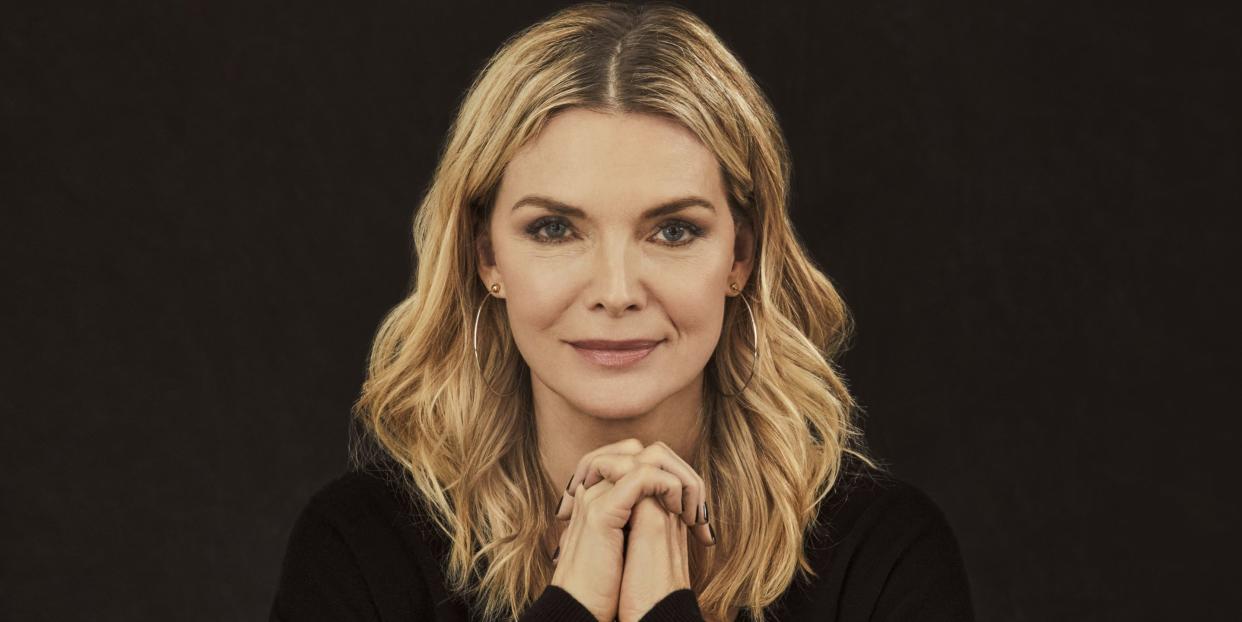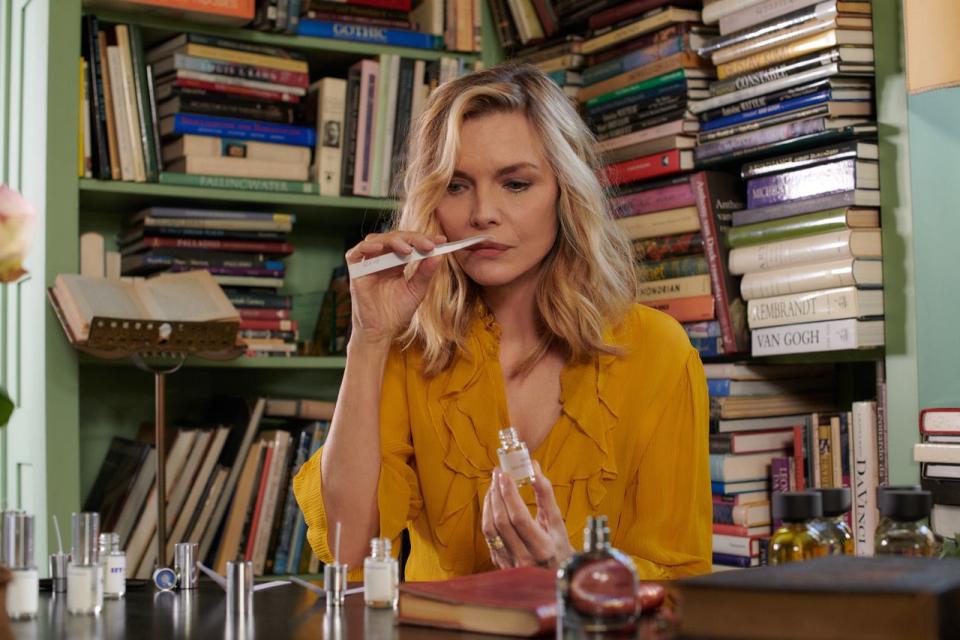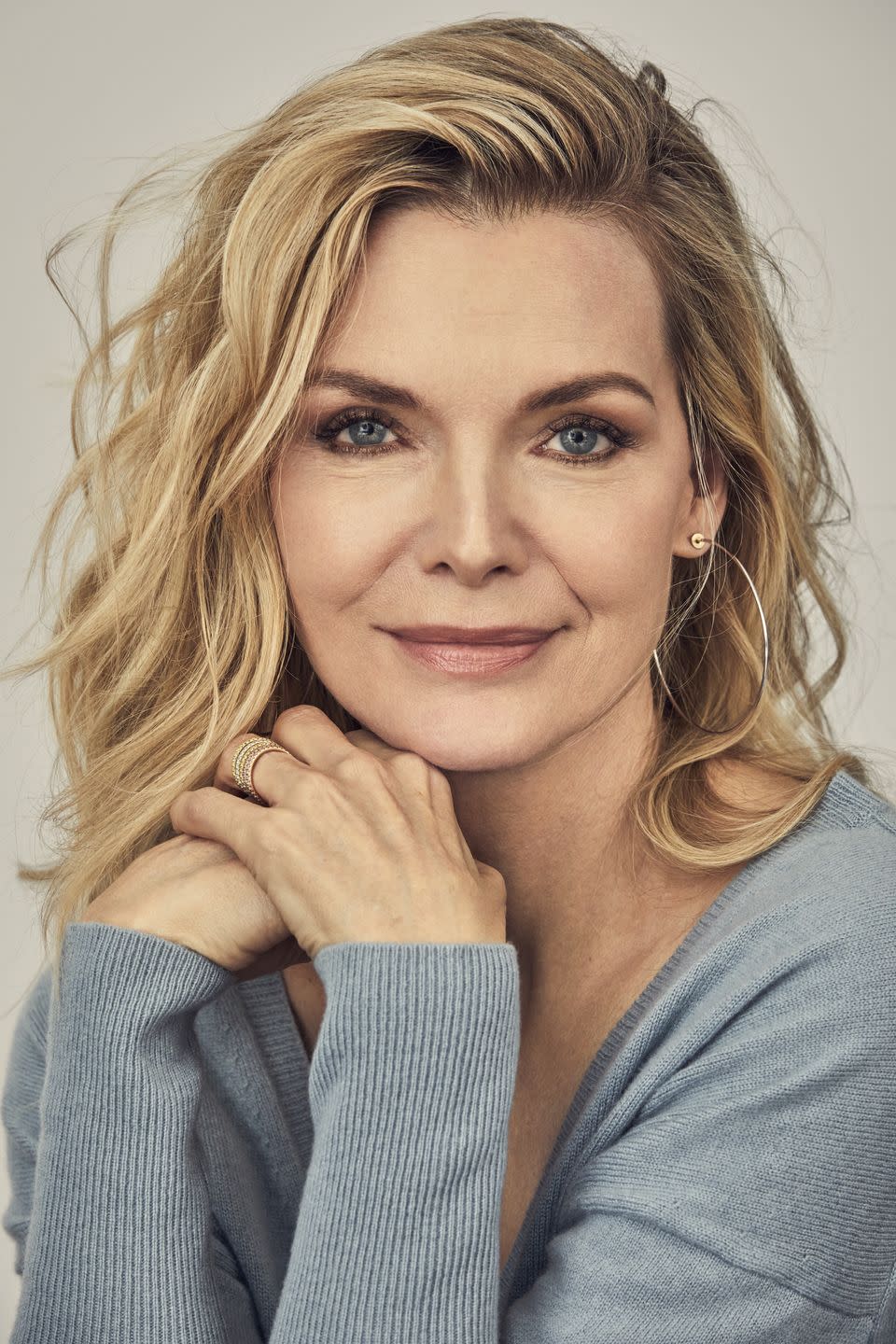Michelle Pfeiffer Thinks Natural Beauty Should Be More Regulated

Michelle Pfeiffer knows we're conducting most of our business from our beds. When we hop on a Zoom call to discuss new products from her personal care brand Henry Rose, she casually comments on my WFH set-up. It's an atmosphere Pfeiffer says has become all too familiar to her. "That's probably where I conduct most of my interviews these days. My husband (Big Little Lies creator David E. Kelley) is off, so I'm in this main room," she says, gesturing to her rustic living area.
In a time when we're all getting reacquainted with our home bases, Pfeiffer's beauty business is rising to the occasion. Henry Rose, named for her children and launched last spring with 100% transparent ingredients, is debuting new categories built for the great indoors. Available October 26, Pfeiffer is introducing candles, diffusers, body creams, and a hand sanitizer in Henry Rose's most popular scents. Candles and diffuser oils are available in both Torn and Jake's House scents, while the body creams arrive in Queens & Monsters and Jake's House.
Per the Henry Rose motto, each product is completely clean and an extension of Pfeiffer's less-is-more approach to beauty. "I'm in like a flannel, and look at my hair. So I kind of love that, " she laughs, when asked about how her routine has changed in 2020. "I feel like we all, it just sounds so corny, but I'm sensing that we're all discovering that our natural beauty is enough in a way that I don't think we understood before." She pauses, adding, "At the same time, what I wouldn't give for a facial. Or just a manicure and a pedicure. It's like I could use a little TLC, I think."
These days, she's focused on filling your home with a beauty experience you can feel good about. Ahead, Pfeiffer talks about the expansion, beginning a new business in her sixties, and what acting taught her about founding Henry Rose.
Congratulations on the Henry Rose expansion. The Queens and Monsters body cream is my new fave. How did you decide to expand your brand?
I started, naively so, wanting to develop just one fragrance. I didn't even know if that was possible. I ended up launching five, which was a miracle, and then now, we are on seven fragrances—the creative process at a certain point kind of takes on a life of its own. As you get further into [the development], you discover fragrance is in everything, and I have incredibly dry skin. My skin is dry and sensitive. I've been using the same body lotion for like 15 years. So that just seemed like a self-explanatory extension. Also, a lot of it is due to customer requests.

Was it always your plan to introduce Jake's House hand sanitizer to the mix?
It probably isn't something we would have thought about, honestly. But again, COVID happened, and it seemed like there was a real need out there. Honestly, this brand started with seeing a real need for something that didn't exist. I mean, hand sanitizer exists obviously, but many hand sanitizers are not that safe to use. People have to be careful when they're not only spraying chemicals in your home but dousing themselves with it daily. With some of these hand sanitizers, you want to make sure that the cure doesn't become worse than the disease. So it's safe to use, and it smells nice.
Henry Rose is known for having 100% transparent ingredients. Why was that so important to you?
This brand came about when I was a new mom. I became concerned about what ingredients I was exposing to my children and my family. I started reading labels at that time, over 25 years ago, and not everybody was labeling. If you were using a skincare line or body care, they might be transparent with most ingredients. But when it came to fragrance listed on the label, it can potentially be a dumping ground. It can be hundreds of thousands of components and combinations of ingredients. Until you know what's in something, you really can't be sure that it is safe. As I did when I started, people naively think, "Well, if it says natural, it must be safe." That's not necessarily true. First of all, natural can mean anything. It's not a regulated term. A lot of people are highly allergic to plant-based materials. Personal care has made a lot of progress in terms of being transparent with ingredients. But the truth is, I still think the cosmetics industry as a whole has a long way to go.
What's the biggest lesson you've learned in the first year and a half of Henry Rose?
I went into this thinking I would do an all-natural plant-based product thinking that would be safest. Then I learned, no, there's a lot of safe synthetics that are a much better option for most people. It was just a constant pivoting like the more I learned, and what I thought I was setting out to do would slightly shift. It initially takes the wind out of your sails, and you think, "Oh, what am I going to do? This is my whole product." Then you realize, okay, it just means it's meant to be something else.
Where do you draw inspiration from for new product?
(whispers) My brain. I think most of us go through life not really thinking about where our inspiration comes from. Then it became clear to me that my emotional attachment to certain scents comes from my past. The very first fragrance, I realized what I was really going after was the scent that my father wore when I was growing up. For me it was just intoxicating, and I've always really gravitated more toward, honestly, men's scents in my life. I think that's probably where the idea of having a genderless line came from.
Are there any unexpected lessons from acting that have informed Henry Rose?
A couple of things. One of the things is the resilience that I built up as an actor has really helped, because this has been really humbling. This whole process, this journey, has really brought me to my knees many times. And being an actor is similar, being able to separate the rejection from who you are as a person. I think obviously without that I would never have accomplished this.
The other thing is the whole reaching back for memories in your past, whether you're creating a moment in a movie, or you're creating a scent that you're trying to capture. Scent really is emotional. I think we don't really know why we respond and are attracted to certain categories of scents, but I believe that it all comes from our past and experiences that we've had and how we associate that scent with an emotion.

You began Henry Rose in your sixties. What's your advice for someone who's starting a second chapter in their career?
If you have an entrepreneurial spirit, you have it, whether you're 18 or you're 60. When you're younger, that na?veté helps in terms of feeling omnipotent in a way, so it gives you sort of a courage. I think maybe as you get older and a little wiser, a little bit more jaded, you lose some of that so you're a little bit more adverse to taking a risk. I never really lost my na?veté, it's the good and the bad thing about me, I tend to jump in feet first.
I knew three years ago when I started (this idea) back up, that this was probably my last shot at it. Not because I was getting too old, but because I saw the space was really moving. Because for the longest time, when I kept trying to get this going, I was really too ahead of the curve and the climate just wasn't quite there yet. The idea of transparency for the consumer has really taken hold and it is really driving things. And I went from nobody wanting to even give me the time of day about this, to three different fragrance houses willing to formulate these fragrances with me. So I think the same principles apply no matter how old you are.
Once the world returns to semi-normal, what's the first thing you look forward to doing?
I miss going to restaurants, and having a lovely dinner and a glass of wine with my husband and my closest friends. Of course I miss my family. I want to have a gathering in my home. Can you imagine? I just got goosebumps.
This interview has been edited and condensed for clarity.
You Might Also Like
